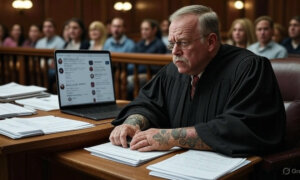Oct. 15, 2010
FACTS
The Supreme Court rendered a decision on a petition filed by 70 other elderly women who demanded reparations for the rape and other atrocities committed against them by the Japanese forces during World War 2.
The Court, through Justice Mariano C. Del Castillo, the ponente of the case, dismissed the petition.
His decision cited several sources, among them were three foreign articles by foreign writers that covered international law concepts such as jus cogens, erga omnes obligations, rape, and human rights.
After one month since the decision of the case, Atty. Herminion Harry Roque, Jr., counsel for the petitioners, alleged through his blog that Justice Del Castillo plagiarized the foreign articles.
Atty. Roque charged Justice Del Castillo of misconduct because Justice Del Castillo copied the foreign articles without acknowledgment, citation, or attribution to the original authors.
Atty. Roque also alleged that Justice Del Castillo committed inexcusable negligence when Justice Del Castillo assigned the case to a court attorney for study, research, and report.
Justice Del Castillo, on the other hand, denied any malicious intent to plagiarize or appropriate another’s work as his own. He presented his court attorney and researcher to explain that the absence of attribution or citation was an accident.
According to Justice Del Castillo’s researcher, in the course of editing and cleaning up her draft of the decision using Microsoft Word, she accidentally deleted the attributions.
As to the delegation of the preparation and drafting of the decision, the researcher said that Justice Del Castillo sets the direction for the research and study. He would discuss the issues of the case with her, set forth his position, and review and comment on the study and research that she was putting on together until he was completely satisfied.
ISSUES
- Whether or not Justice Del Castillo’s mistake of citing the wrong sources, failure to use quotation marks, and inadvertent omission of necessary information from footnotes and endnotes constitute misconduct.
- Whether or not Justice Del Castillo’s delegation to his court attorney the study and research for the preparation of the decision was inexcusable negligence.
RULING
1. Whether or not Justice Del Castillo’s mistake of citing the wrong sources, failure to use quotation marks, and inadvertent omission of necessary information from footnotes and endnotes constitute misconduct.
NO, Justice Del Castillo’s mistake of citing the wrong sources, failure to use quotation marks, and inadvertent omission of necessary information from footnotes and endnotes does NOT constitute misconduct.
These do not, in every case, amount to misconduct. Only errors that are tainted with fraud, corruption, or malice are subject of disciplinary action. This is not the case here. Justice Del Castillo’s acts or omissions were not shown to have been impelled by any of such disreputable motives. If the rule were otherwise, no judge or justice, however competent, honest, or dedicated he may be, can ever hope to retire from the judiciary with an unblemished record.
2. Whether or not Justice Del Castillo’s delegation to his court attorney the study and research for the preparation of the decision was inexcusable negligence.
NO, Justice Del Castillo’s delegation to his court attorney the study and research for the preparation of the decision was NOT inexcusable negligence.
Based on the evidence, Justice Del Castillo did not abdicate the writing of the case decision to his researcher.
As his researcher testified, the Justice set the direction that the research and study were to take by discussing the issues with her, setting forth his position on those issues, and reviewing and commenting on the study that she was putting together until he was completely satisfied with it. In every sense, Justice Del Castillo was in control of the writing of the report to the Court, which report eventually became the basis for the decision, and determined its final outcome.
Assigning cases for study and research to a court attorney, the equivalent of a “law clerk” in the United States Supreme Court, is standard practice in the high courts of all nations. This is dictated by necessity. With about 80 to 100 cases assigned to a Justice in our Court each month, it would be truly senseless for him to do all the studies and research, going to the library, searching the internet, checking footnotes, and watching the punctuations. If he does all these by himself, he would have to allocate at least one to two weeks of work for each case that has been submitted for decision. The wheels of justice in the Supreme Court will grind to a halt under such a proposition.
What is important is that, in this case, Justice Del Castillo retained control over the writing of the decision in the Vinuya case without, however, having to look over his researcher’s shoulder as she cleaned up her draft report to ensure that she hit the right computer keys.
Can errors in preparing decisions be prevented? Not until computers cease to be operated by human beings who are vulnerable to human errors. They are hypocrites who believe that the courts should be as error-free as they themselves are.
DISPOSITIVE PORTION
WHEREFORE, in view of all of the above, the Court:
- DISMISSES for lack of merit petitioner Vinuya, et al.’s charges of plagiarism, twisting of cited materials, and gross neglect against Justice Mariano C. del Castillo;
- DIRECTS the Public Information Office to send copies of this decision to Professors Evan J. Criddle and Evan Fox-Descent, Dr. Mark Ellis, and Professor Christian J. Tams at their known addresses;
- DIRECTS the Clerk of Court to provide all court attorneys involved in legal research and reporting with copies of this decision and to enjoin them to avoid editing errors committed in the Vinuya case while using the existing computer program especially when the volume of citations and footnoting is substantial; and
- Finally, DIRECTS the Clerk of Court to acquire the necessary software for use by the Court that can prevent future lapses in citations and attributions.
Further, the Court DIRECTS the Committee on Ethics and Ethical Standards to turn over to the en banc the dummy as well as the signed copy of petitioners’ Exhibit J, entitled “Restoring Integrity,” a statement by the Faculty of the University of the Philippines College of Law for the en banc’s consideration in relation to the separate pending matter concerning that supposed Faculty statement.
SO ORDERED.
Full text of this decision.






